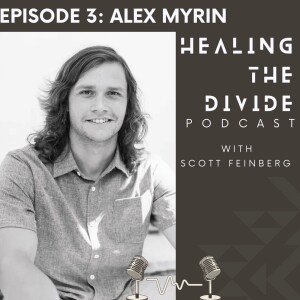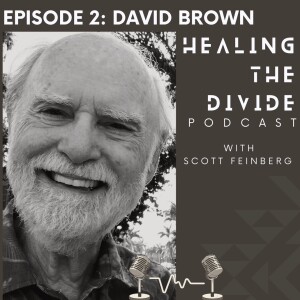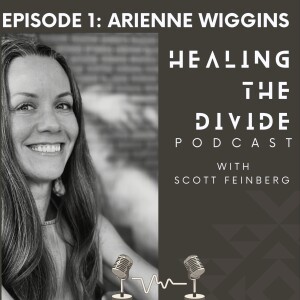Healing The Divide with Scott Feinberg
Truly powerful conversation is not only what it says to you. But what it does to you. The echo it leaves long after it ends. Touched not only by its content but its tenor. It’s texture. It’s capacity to bring healing to the divide both within us and amongst us. Each podcast is a conversation exploring the intersectional relationship between political reform, deep healing, global events, philosophy, spirituality, art, and the shared human experience.
Episodes

Tuesday Jan 16, 2024
Tuesday Jan 16, 2024
In this episode, Scott Feinberg interviews Alex Myrin, an Army veteran who found healing through ayahuasca and other practices.
They discuss the limitations of traditional therapy and the importance of feeling and processing emotions. They also explore the need for individualized approaches to healing and the role of integration and embodiment practices.
The conversation emphasizes the importance of discipline and gentleness in the healing journey and reframing self-identity and value. This part of the conversation explores the grandiose and catastrophic nature of life, the understanding of ayahuasca and its brewing process, the physiological processes and neural pathways impacted in ayahuasca, the nature of self, life, and reality, the revelation of fundamental unity, and the implications of ayahuasca for world leaders.
In this conversation, Scott and Alex explore the themes of self-perception, surrender, acceptance, trust, love, compassion, the calling to ayahuasca, curiosity, and embracing the mystery of life. They discuss the dance of self-perception and possibilities for self-expression and growth. They also touch on the art of surrender and accepting things as they are, as well as the importance of humility and recognizing that even the struggles and mistakes have led to the present moment.
Trusting the process and taking appropriate action while holding love and compassion for others is emphasized. The conversation concludes with a discussion on the calling to ayahuasca and the importance of curiosity and desire in exploring one's path. Ultimately, they highlight the beauty of embracing the mystery of life and finding joy in the journey itself.
Takeaways
Traditional therapy may provide a pressure release valve but often fails to address the root causes of trauma and emotional struggles.
Ayahuasca and other plant medicines can offer a pattern disruption and provide a deeper understanding of one's issues.
Integration is a personalized process that requires implementing new practices and reframing beliefs.
Discipline and gentleness are key in the healing journey, allowing for self-nurturing and self-compassion.
Shifting from a mindset of need to one of gratitude and opportunity can transform the healing process. Ayahuasca is a powerful psychedelic tea brewed from the ayahuasca vine and chakruna leaves.
The brewing process of ayahuasca is a ceremony that requires care, attention, and intention.
Ayahuasca can excavate trauma stored in the body and create new neural pathways in the brain.
The experience of ayahuasca can lead to a deep understanding of fundamental unity and the interconnectedness of all things.
Ayahuasca has the potential to open dialogue and create a more humbled and raw emotional state for world leaders. Recognizing and accepting the dance of self-perception allows for self-expression and growth.
Surrendering and accepting things as they are leads to humility and a deeper understanding of oneself.
Trusting the process and taking appropriate action while holding love and compassion for others is essential.
The calling to ayahuasca can be recognized through curiosity and desire, and exploring one's path is a personal journey of self-discovery.

Tuesday Jan 09, 2024
Tuesday Jan 09, 2024
Summary
In this episode, Scott Feinberg is joined by David Brown to explore the topics of non-duality and the human condition. They discuss the concept of non-duality and its essence, which goes beyond the external plurality and speaks to the deeper unity that pervades. They also delve into the illusory nature of reality and the gradual process of awakening to truth. The conversation touches on the potential for spiritual bypass and the importance of integrating philosophy and psychology in a way that supports healing. They conclude by exploring the three states of mind and the role of love in the journey of self-discovery. The conversation explores the journey from unawareness to the Rajasic state, where one can make choices and pursue success. It then delves into the role of grace and the shift to the Sattvic state, where the desire to learn and the willingness to accept new understanding arise. The speaker shares personal experiences of trauma and the turning point that led to a deep immersion in yoga and Vedanta. The importance of discernment, values, and taking action in the world is emphasized. The conversation concludes with a reflection on the difference between the real and the unreal. The conversation explores the existence of physical issues beyond Ukraine and Israel-Palestine, including those in Africa and North Korea. It emphasizes the importance of focusing on our own countries and addressing the divisiveness and issues at home before attempting to solve problems in other nations. The discussion also highlights the need to disown fake news and promote a saner and more balanced platform. The conversation concludes with a call to share meaningful conversations and move forward together for a more peaceful world.
Takeaways
Non-duality is the understanding that there is no separation in truth and that all human beings are part of one interconnected family.
The illusory nature of reality is a central theme in non-duality, as it challenges our perception of the world and invites us to see beyond the conditioning of our minds.
Spiritual bypass can occur when we use spiritual teachings to avoid facing our unresolved traumas and wounds. It is important to integrate philosophy and psychology in a way that supports healing and growth.
The process of awakening to truth is gradual and requires letting go of identification with the ego and embracing the presence of love.
The three states of mind (tamasic, rajasic, and sattvic) can help us understand our own psychological process and make choices that align with our true nature. Moving from unawareness to the Rajasic state involves recognizing the limitations of a stagnant mindset and embracing change.
Grace plays a significant role in presenting teachings that can be utilized for personal growth and transformation.
Traumatic life situations can lead to a desire for deeper understanding and a willingness to learn.
Taking action in the world requires discernment, values, and a commitment to making a positive impact.

Tuesday Jan 02, 2024
Tuesday Jan 02, 2024
In this episode, Scott Feinberg explores the relationship between conflict and connection with guest Arienne Wiggins. They discuss the importance of creating a safe container for difficult conversations and the role of consent in engaging in dialogue.
They also delve into the source of conflict and the impact of trauma on triggering conflict. The conversation highlights the power of curiosity, validation, and empathy in navigating conflict and finding deeper connection.
They emphasize the need for deep listening and the ability to hold validation and disagreement simultaneously. The episode concludes with a discussion on changing seats of listener and receiver in dialogue.
This conversation explores the importance of slowing down and lingering in conversations, moving from validation to empathy, and the practice of empathy. It also delves into the resistance to feeling difficult emotions and the potential for creating change through conversation. The application of coupleship learnings to a geopolitical context is discussed, as well as the healing that comes from being heard and seen.
The ripple effect of healing work and the importance of sharing for clarity are explored. The conversation also touches on moving towards integration, defining feminism, and whether best to establish equality through equity or merit. The swing of tyranny and the need for caretakers are examined, and the conversation concludes with a focus on belonging and navigating conflict.







